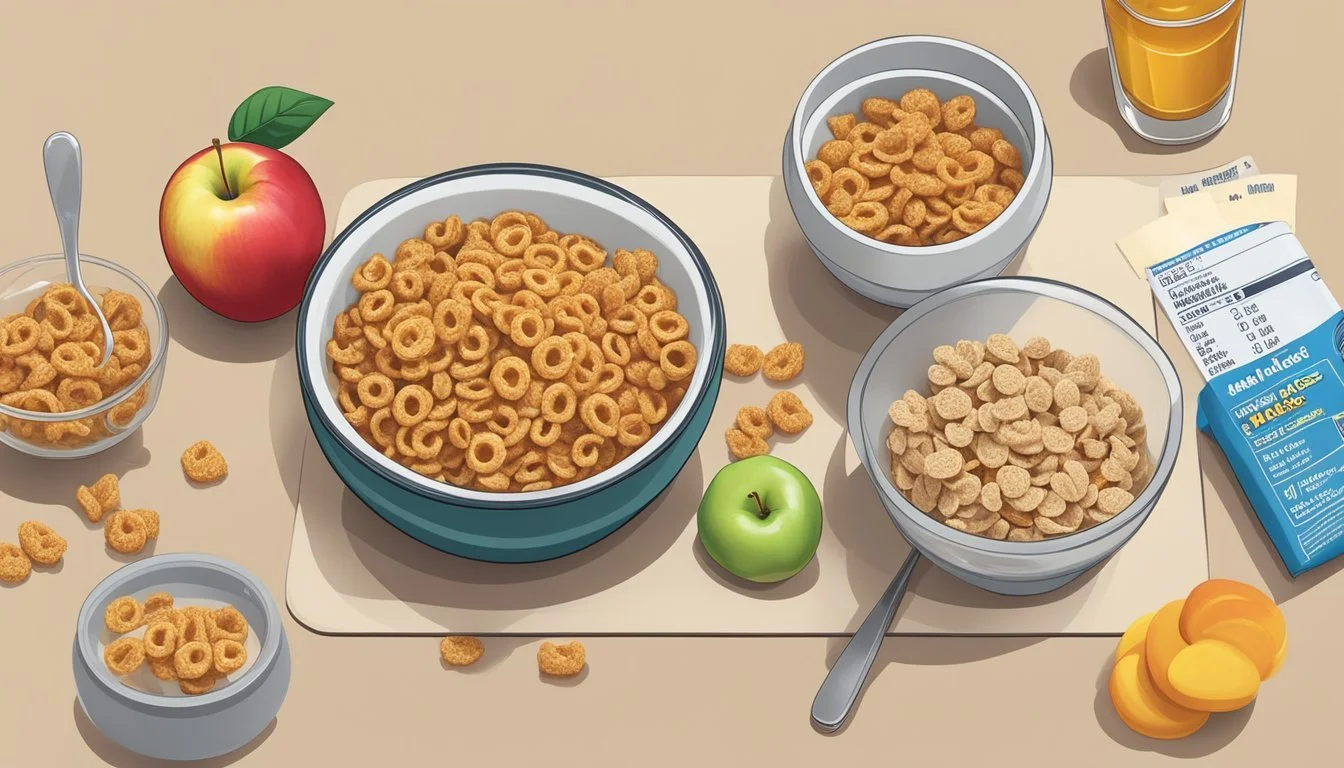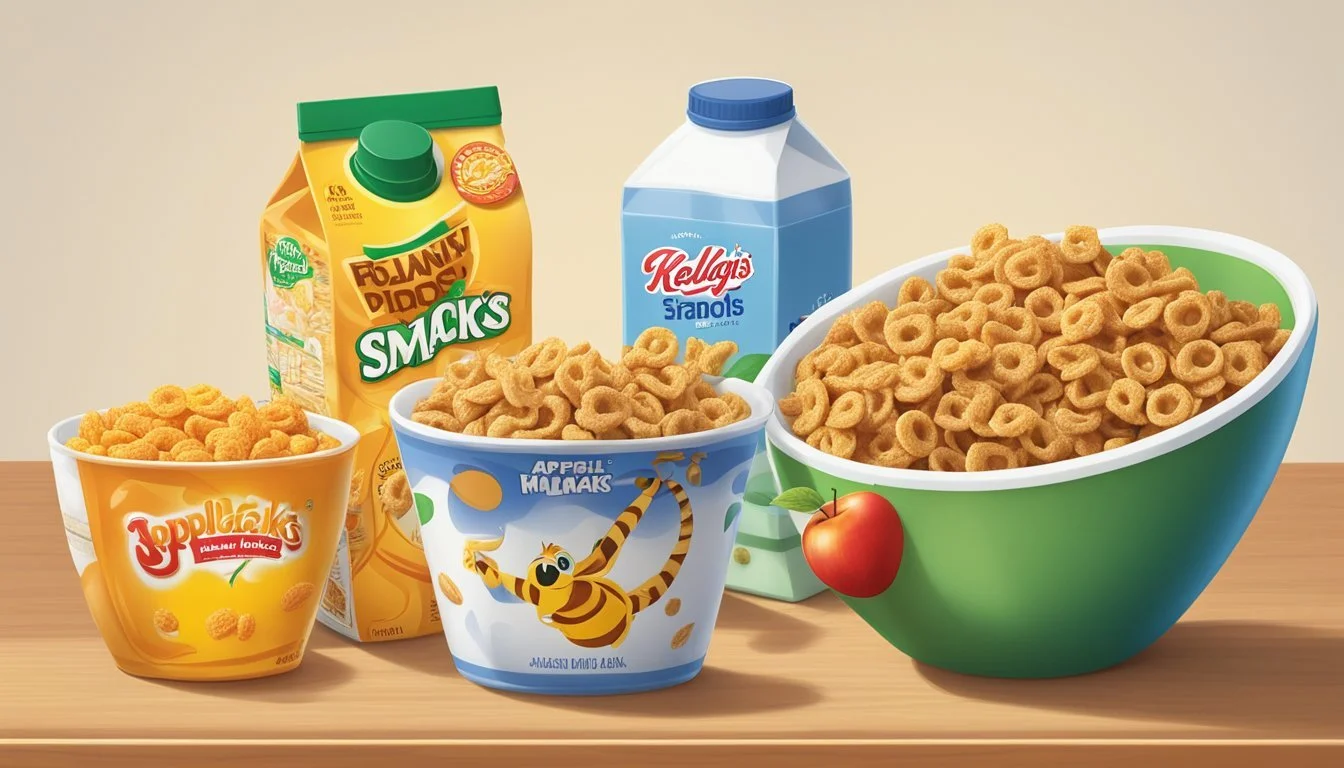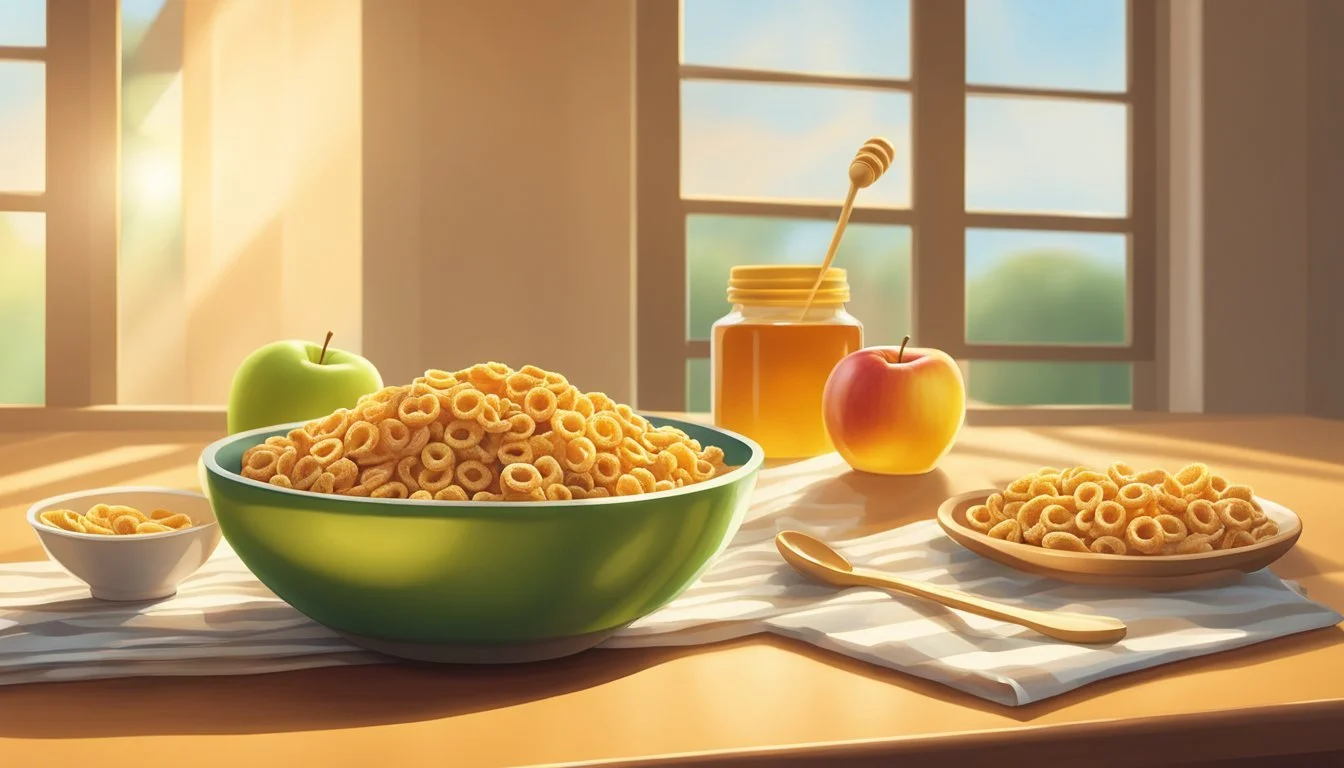Honey Smacks vs Kellogg's Apple Jacks
Breakfast Showdown
This Article is Part of Our Breakfast Cereal Guide with Details on Honey Smacks Nutrition and Kellogg's Apple Jacks Nutrition
When it comes to choosing a healthier breakfast cereal in 2024, many find themselves comparing Honey Smacks and Kellogg's Apple Jacks. Both cereals, offered by Kellogg's, are popular among children and adults, but their nutritional profiles differ significantly. Honey Smacks garners a reputation for being the least healthy, as 60 percent of its calories come from sugar.
By contrast, Apple Jacks, while also sugary, do not quite reach the same sugar levels found in Honey Smacks. For those prioritizing vitamins and minerals in their morning meal, Apple Jacks might slightly edge out Honey Smacks due to its more balanced nutritional composition. Exploring these differences can guide better breakfast choices amid the myriad of options on grocery shelves.
Understanding these cereals' health impacts can help consumers make informed decisions. The analysis delves deeper into their ingredients and nutritional value, ensuring a clear comparison and aiding in the pursuit of better dietary habits.
Cereal Showdown: Honey Smacks vs. Apple Jacks
Honey Smacks and Apple Jacks are two popular cereals produced by Kellogg's. Each cereal has unique attributes, including branding, mascots, and history that differentiate them in the market.
Brand Heritage and Manufacturer
Honey Smacks, originally introduced as Sugar Smacks in the 1950s, has a rich history under the Kellogg's brand. Over the years, the name changed to Honey Smacks in 1983 to reflect shifting consumer preferences towards healthier-sounding product names, though its sugar content remained significant.
Kellogg's Apple Jacks, on the other hand, debuted in 1965. It appeals to children with its sweet, cinnamon-apple flavor. The cereal has undergone various recipe tweaks and marketing changes to maintain its relevance, yet it consistently positions itself within Kellogg's vast cereal portfolio.
Cereal Mascots and Branding
Honey Smacks is perhaps best known for its mascot, Dig'em Frog, introduced in the 1970s. This character has become iconic, recognizable by his green color and lively personality. Dig'em Frog's presence reinforces the fun and playful nature of the cereal, targeting younger audiences.
Kellogg's Apple Jacks features mascots Apple and CinnaMon, which emphasize the cereal's key flavors. The characters offer a relatable and entertaining narrative for kids, visually representing the taste profile. Branding typically involves bright, engaging packaging designed to catch the eye of children and parents alike.
The effective use of mascots and strategic branding has kept both cereals popular. While Honey Smacks leans heavily on nostalgia, Apple Jacks continuously innovates to reach new generations.
Nutritional Comparison
This section discusses the significant differences in the nutritional profiles of Honey Smacks and Kellogg's Apple Jacks, covering sugar content, calories, vitamins and minerals, and macronutrient composition.
Sugar Content Analysis
Honey Smacks is notorious for its high sugar content, with approximately 60% of its calories coming from sugars. A single serving of Honey Smacks contains about 18 grams of sugar, making it one of the sweetest cereals on the market.
In comparison, Kellogg's Apple Jacks has slightly less sugar, with around 12 grams per serving. Despite being lower than Honey Smacks, this amount is still significant, contributing heavily to the cereal's overall calorie content. Both cereals, therefore, are high in sugar, which may be a concern for those monitoring their sugar intake.
Caloric Values
When comparing the caloric values, both cereals are calorie-dense due to their high sugar content. Honey Smacks has approximately 110 calories per 3/4 cup serving. This figure can quickly add up when larger portions are consumed, particularly given its sweet nature.
Kellogg's Apple Jacks also offers a calorie count of around 110 calories per one cup serving. Although the serving size is different, the caloric intake remains similar, primarily driven by the cereals' sugar content. These cereals can contribute substantially to daily caloric intake if not consumed in moderation.
Vitamins and Minerals Content
Honey Smacks and Apple Jacks both contain added vitamins and minerals. Honey Smacks is fortified with several essential nutrients, including B vitamins (B6, B12), iron, and zinc. These additions aim to improve the cereal's nutritional value despite its high sugar content.
Kellogg's Apple Jacks similarly contains added vitamins and minerals. This includes vitamin C, calcium, and iron, contributing to the essential nutrients needed in a daily diet. The fortification helps mitigate some of the nutritional shortcomings prevalent in sugary cereals, but it does not fully offset their high sugar levels.
Fiber, Protein, and Fat
In terms of fiber content, both Honey Smacks and Apple Jacks are relatively low. Honey Smacks contains about 1 gram of fiber per serving, which is quite minimal. This low fiber content can result in a quicker spike in blood sugars.
Kellogg's Apple Jacks fares slightly better with around 2 grams of fiber per serving, providing a marginally better option for those seeking some dietary fiber. Both cereals also have low protein and fat content. Honey Smacks typically has less than 1 gram of fat and about 2 grams of protein per serving. Apple Jacks are similar, with 1 gram of fat and 2 grams of protein.
Neither cereal offers significant amounts of healthy fats or substantial protein, making them less ideal options as protein-rich or heart-healthy breakfast choices.
Ingredient Profile
In this section, we will examine the ingredients of Honey Smacks and Kellogg's Apple Jacks, highlighting the key components and any additives and colorings used.
Cereal Ingredients Comparison
Honey Smacks and Kellogg's Apple Jacks differ in their primary ingredients. Honey Smacks is primarily made of puffed wheat sweetened with various sugars. Among the main components are wheat, sugar, honey, and dextrose. It is designed to be a sweetened puffed wheat cereal.
In contrast, Kellogg's Apple Jacks employs a mix of corn and oat flour. The cereal also includes sugar, wheat flour, and cinnamon alongside apple juice concentrate, giving it its distinctive flavor. Both cereals contain added salt and corn syrup, which contribute to the taste and texture.
Additives and Colorings
Honey Smacks and Kellogg's Apple Jacks contain various additives to enhance flavor and preserve freshness. Vitamin E is used in both to maintain freshness. Honey Smacks generally has fewer artificial colorings.
Kellogg's Apple Jacks is noted for its use of vibrant colorings such as Yellow 5, Yellow 6, Red 40, and Blue 1. These colorings contribute to the fun, bright appearance of the cereal. Apple Jacks also use palm oil, which is less common in Honey Smacks' ingredient list.
By focusing on the ingredients and additives, consumers can better understand the components of these cereals and make informed choices based on their dietary preferences and concerns.
Health and Dietary Considerations
In modern Western diets, breakfast cereals are a popular choice, though some are more nutritious than others. This analysis covers health aspects of Honey Smacks and Kellogg's Apple Jacks, focusing specifically on sugar content and potential allergens.
Breakfast Cereal as a Healthy Option
Breakfast is considered the most important meal of the day, but Honey Smacks and Kellogg's Apple Jacks may not be the ideal healthy breakfast.
Honey Smacks contain a significant amount of sugar, with about 15 grams per serving. This equates to roughly 60% of its calories originating from sugar. Kellogg's Apple Jacks also contain a high sugar content, though it is slightly less critical than Honey Smacks.
Neither cereal offers impressive dietary fiber, which is crucial for a balanced diet. Honey Smacks provide just one gram of fiber per serving, while Kellogg's Apple Jacks offer about three grams. Insufficient fiber can result in less satiety and poorer digestive health.
Cereal Sugar per Serving Fiber per Serving Honey Smacks 15 grams 1 gram Kellogg's Apple Jacks 12 grams 3 grams
Allergens and Dietary Restrictions
Honey Smacks and Kellogg's Apple Jacks contain ingredients that might trigger allergic reactions. Common allergens found in these cereals include wheat and soy, both prevalent in various breakfast cereals.
Those with gluten intolerance or celiac disease should avoid these cereals. Additionally, SmartLabel can be a useful tool to identify potential allergens, as it provides detailed ingredient information directly from the manufacturer.
Honey Smacks generally accommodate fewer dietary restrictions due to fewer ingredients compared to Kellogg's Apple Jacks, which contain more artificial colors and flavors. Always verify the SmartLabel or consult the manufacturer's website for the most current dietary information.
Consumer Insights
Honey Smacks and Kellogg's Apple Jacks have different trajectories in terms of market trends and customer safety. Consumer behavior and health concerns play significant roles in shaping their respective popularity.
Market Popularity and Trends
Honey Smacks and Apple Jacks are both popular breakfast cereals from Kellogg's.
According to market research, Apple Jacks often enjoys a steady fan base due to its fruity and sweet flavor, appealing to both children and adults. Studies show that colorful cereals tend to attract younger consumers. Sales analytics depict that novelty and consistent marketing campaigns keep Apple Jacks relevant.
Honey Smacks has a distinctive honey flavor that attracts health-conscious buyers who prefer a sweeter taste with fewer artificial additives. They see a spike in popularity during health trends focusing on more natural sweeteners. Data indicates that Honey Smacks often appeals to an older demographic seeking a nostalgic yet relatively healthy breakfast option.
Recalls and Safety Concerns
Safety recalls impact consumer trust and market performance. In June 2018, Honey Smacks faced a significant recall due to a salmonella outbreak, causing widespread concern. The recall affected consumer perception, and some were hesitant to return to the brand even after safety reassurances.
Apple Jacks, meanwhile, has maintained a stable safety record with no major recalls, which has helped sustain consumer trust over time. The lack of significant health concerns solidifies its position as a reliable choice for families.
Comparing the two brands, Honey Smacks had to work hard to rebuild credibility post-recall, while Apple Jacks continued to benefit from its consistent safety profile. Safety and health assurances play a crucial role in consumer decision-making processes for these breakfast staples.
Global Presence
Kellogg's Apple Jacks and Honey Smacks have established themselves in numerous international markets, adapting to regional tastes and availability. The reach of these cereals spans across continents, delivering distinct flavors to breakfast tables worldwide.
Availability Across International Markets
Both Kellogg's Apple Jacks and Honey Smacks are widely accessible beyond the United States, penetrating key international markets. In Germany, Spain, France, Belgium, and the Netherlands, these cereals are often found in large retail chains like Aldi and specialty stores. Canada and Australia also see significant distribution, with popular grocery stores stocking these products.
International markets sometimes offer limited-time promotions or special packaging to appeal to local consumers. Seasonal releases and unique marketing campaigns help maintain and grow the cereals’ presence in these regions.
Cereal Variants and Regional Adaptations
To cater to diverse preferences, both Apple Jacks and Honey Smacks have introduced variants that align with regional tastes. In some markets, for instance, the sweetness level in Honey Smacks may be adjusted, or Apple Jacks may feature added flavors to cater to local palettes.
Packaging and portion sizes can differ as well. In Europe, smaller packs might be more common, fitting the continental breakfast habits. In Australia, special editions or locally-inspired flavors are sometimes released to appeal to specific tastes and dietary trends prevalent in the region.
Specific regional preferences and cultural influences play a crucial role in the adaptation of these cereals, ensuring they not only fit but thrive in the global marketplace.
Historical Development
The historical development of Honey Smacks and Kellogg's Apple Jacks highlights their unique origins and changing consumer perceptions over time.
Origins and Evolution
Honey Smacks was first introduced as Sugar Smacks in 1953 by Kellogg's. It was part of a wave of sugar-centric cereals that aimed to attract younger consumers. Initially, the cereal was marketed with a clown mascot. Over time, the name was changed to Honey Smacks to reflect health-conscious shifts.
The recipe has long included puffed wheat sweetened with honey. Contrastingly, Kellogg's Apple Jacks was launched in 1965. Inspired by the popularity of apple flavors, it quickly became a breakfast staple. The cereal is a mix of orange and green loops flavored with apple and cinnamon, which was a unique combination at the time.
Evolving Consumer Perceptions
Consumer perceptions have significantly shaped both cereals' trajectories. Initially, Sugar Smacks capitalized on the appeal of sugary breakfasts. As health awareness grew, the product was rebranded and reformulated. Despite being renamed Honey Smacks, it remains one of the highest-sugar cereals, which continues to draw both criticism and loyalty.
Kellogg's Apple Jacks has maintained a more stable image. While it also faced scrutiny over sugar content, the brand has managed to position itself as an “apple cinnamon” flavor option that can fit into a balanced diet. Marketing also shifted to emphasize fun, family-friendly aspects, maintaining its long-standing popularity.
Both cereals have used branding and reformulation to navigate changing market demands and consumer health trends.
More on Honey Smacks
More on Kellogg's Apple Jacks
Cinnamon Toast Crunch vs Kellogg's Apple Jacks: Which is better?
French Toast Crunch vs Kellogg's Apple Jacks: Which is better?
Honey Nut Cheerios vs Kellogg's Apple Jacks: Which is better?
Kellogg's Apple Jacks vs Kellogg's Froot Loops: Which is better?
Kellogg's Apple Jacks vs Post GrapevsNut Flakes: Which is better?
Kellogg's Apple Jacks vs Post Raisin Bran Cereal: Which is better?






